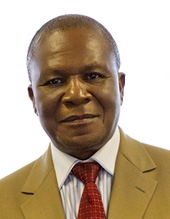Half a billion people in sub-Saharan Africa rely on agriculture for their livelihood. But the 226 million people who continue to be chronically undernourished on the continent are a testimony to the ineffective investments towards the agricultural sector over the past decade. Africa cannot and should not be allowed to remain an island of poverty in the midst of a sea of global plenty. As a global community we must not sit passively as Africa remains the hallmark of hunger and poverty.
Agriculture is fundamental to achieving the continent’s food security and socio-economic development goals. Not only can improved agriculture systems in Africa produce the food to feed a growing global population, it can also generate jobs, wealth, economic growth an ultimately, eradicate poverty.
By recognizing 2014 as the Year of Agriculture and Food Security, a doorway to 2015, the African Union has once again given special focus to the illusive MDG goal number one, of eradicating extreme poverty and hunger. The reality is that many contraints still stifle productivity levels of the continent’s smallholder farmers. A critical aspect that is still neglected is access to fertilizer.
Fertilizers have been proved to double or even triple yields within a single cropping season. For every 1 kg of nutrient applied, farmers obtain 5-30 kg of additional product. Yet fertilizer in Africa is woefully underused. It is estimated that African soils lose 8 million tonnes of nutrients per year and that 75% of the continent has been degraded to the point of greatly reduced productivity.
Although African Heads of State took action in the Abuja Declaration of 2006, making the commitment to raise fertilizer use to 50 kg per hectare by 2015, the current average rate is still close to 10 kg per hectare. When compared to the global average of over 100 kg per hectare, it is clear that not enough progress has been made.
What is stopping fertilizer reaching the 500 million smallholder farmers in Africa, and what can be done?
High transaction costs, particularly transport cost, mean retail fertilizer prices in Africa are significantly higher than in the rest of the world, making them prohibitively expensive for the majority of small farmers.
But improving access to fertilizers, and closing the Africa yield gap once and for all is not impossible. This week, my organisation and seven others from both the public and private sector demonstrated their willingness to improve fertilizer access to African smallholders, by issuing an open letter to the African Heads of State meeting at the AU Summit in Equatorial Guinea. In this letter we called upon African leaders to work with the private sector, researchers and civil society in six key areas:
- Provide access to credit, finance and insurance. If farmers are loaned the capital to purchase fertilizer, they will be able to repay these loans with their increased income. The work of One Acre Fund shows just how this can work.
- Facilitate imports and the distribution of diverse fertilizer products. Remote areas must be reached with these vital products, so improved distribution networks must be created.
- Invest in infrastructure: transport, handling, storage, and blending facilities. Without ports, roads and warehouses, an effective distribution network cannot exist.
- Develop mobile technologies to provide information on markets, extension services and prices. Timely information is key to farmers making the most profit; mobile technology puts power back into the hands of the farmer.
- Train extension workers to help farmers organize themselves. When organized into groups, farmers can aggregate demand for fertilizer and purchase higher volumes.
- Disseminate best practices based on the integration of organic and mineral nutrients and balanced fertilization. Farmers must be educated on how to use fertilizer in both a cost-effective and environmentally sound way, as overuse can be just as detrimental as underuse.
I believe that transformation of the agriculture sector in Africa does not simply lie in the hands of African governments, but rather in the hands of “a global coalition of the willing”. It is our job to raise our voices and put our technical expertise at the disposal of governments who can change policies and implement change.
Raising Africa’s agricultural productivity is one of the most pressing challenges of our time. As President Nwanze of the International Fund for Agricultural Development commented this week, “it is not a dream, it is a responsibility”. We are ready and willing to close the Africa yield gap – let us take action today.



